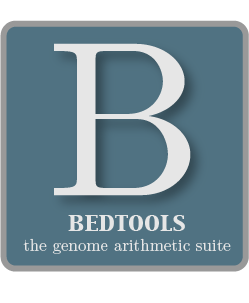5.8 mergeBed¶
mergeBed combines overlapping or “book-ended” (that is, one base pair away) features in a feature file into a single feature which spans all of the combined features.
5.8.1 Usage and option summary¶
Usage:
mergeBed [OPTIONS] -i <BED/GFF/VCF>
| Option | Description |
|---|---|
| -s | Force strandedness. That is, only merge features that are the same strand. By default, this is disabled. |
| -n | Report the number of BED entries that were merged. 1 is reported if no merging occurred. |
| -d | Maximum distance between features allowed for features to be merged. Default is 0. That is, overlapping and/or book-ended features are merged. |
| -nms | Report the names of the merged features separated by semicolons. |
5.8.2 Default behavior¶
Figure:
Chromosome ~~~~~~~~~~~~~~~~~~~~~~~~~~~~~~~~~~~~~~~~~~~~~~~~~~~~~~~~~~~~~~~~
BED FILE ************* *************** **********************
********
Result =============================== ======================
For example:
cat A.bed
chr1 100 200
chr1 180 250
chr1 250 500
chr1 501 1000
mergeBed -i A.bed
chr1 100 500
chr1 501 1000
5.8.3 (-s)Enforcing “strandedness”¶
This option behaves the same as the -s option for intersectBed while scanning for features that should be merged. Only features on the same strand will be merged. See the discussion in the intersectBed section for details.
5.8.4 (-n)Reporting the number of features that were merged¶
The -n option will report the number of features that were combined from the original file in order to make the newly merged feature. If a feature in the original file was not merged with any other features, a “1” is reported.
For example:
cat A.bed
chr1 100 200
chr1 180 250
chr1 250 500
chr1 501 1000
mergeBed -i A.bed -n
chr1 100 500 3
chr1 501 1000 1
5.8.5 (-d)Controlling how close two features must be in order to merge¶
By default, only overlapping or book-ended features are combined into a new feature. However, one can force mergeBed to combine more distant features with the -d option. For example, were one to set -d to 1000, any features that overlap or are within 1000 base pairs of one another will be combined.
For example:
cat A.bed
chr1 100 200
chr1 501 1000
mergeBed -i A.bed
chr1 100 200
chr1 501 1000
mergeBed -i A.bed -d 1000
chr1 100 200 1000
5.8.6 (-nms)Reporting the names of the features that were merged¶
Occasionally, one might like to know that names of the features that were merged into a new feature. The -nms option will add an extra column to the mergeBed output which lists (separated by semicolons) the names of the merged features.
For example:
cat A.bed
chr1 100 200 A1
chr1 150 300 A2
chr1 250 500 A3
mergeBed -i A.bed -nms
chr1 100 500 A1;A2;A3
